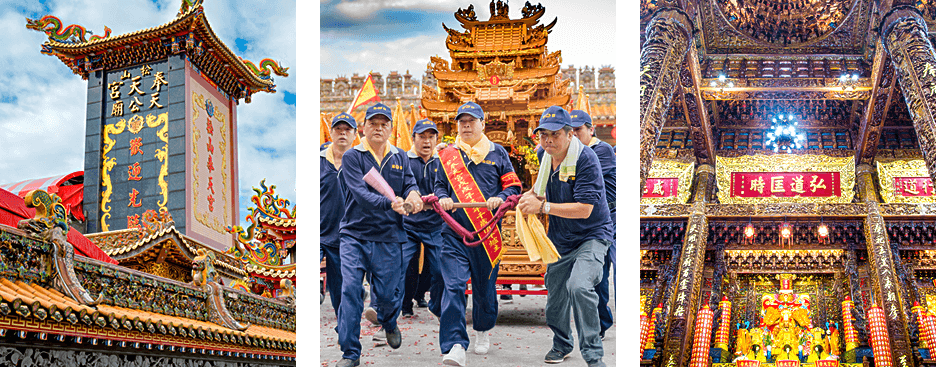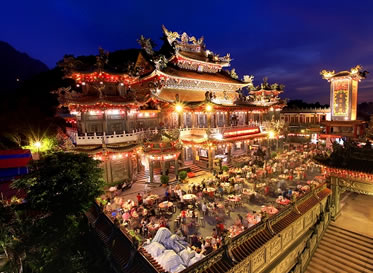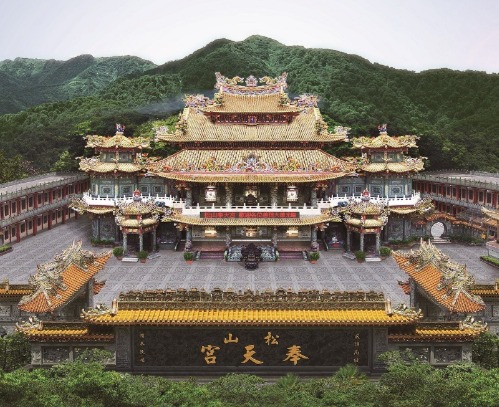

The temple serves to worship the gods and honor ancestors,
to express gratitude and be mindful of one’s origins through Taoist teachings.
Construction of sacred temples and performance of solemn Taoist keyi ceremonies bring blessings to the faithful. In the spirit of a reverence for the heavens and a love for humankind, the temple aids the weak and supports the infirm by engaging in various public welfare charities. An advocacy of aesthetic and moral education elevates the spiritual realm and cleanses human hearts to establish a harmonious and stable society. The strength day of the people is unified according to the concept of “the Tao is as it exists by nature, revere the heavens and respect the earth” (道法自然, 尊天敬地), to honor nature and protect the environment so that natural resources and life can remain vital and development can be sustained.

Geographical location
Comprise of Tiger, Leopard, Lion, and Elephant Mountains.
The Songshan Feng Tian Temple is located at the foothills of Tiger Mountain among the Four Beast Mountains that comprise of Tiger, Leopard, Lion, and Elephant Mountains. It is adjacent to Thumb Mountain and Bijia Mountain, in close proximity to the seat of the City Government and Xinyi Business Circle. Backed by the lush trees and pure springs in the stretch of verdant mountains, the temple overlooks the peaks of Datunshan, Qixingshan, Shamaoshan, and Guanyinsha mountains. The Tiger Mountain Trail of the Four Beast Mountains here is a necessary destination for hikers. The gathering crowds have created a thriving marketplace that satisfies the needs of the hikers as well as provides for the daily necessities of food and clothing for area residents. To the right of the temple are Liugongguomin Junior High School and Fude Elementary School, the spiritual ground and human intellect create a thriving air of culture. Its elevation provides a spectacular panorama of the city below, with beautiful vistas as far as the eyes can see. Providing tranquility within the bustle, the temple is a perfect destination for citizens to hike and to settle their hearts and souls.
Historical Timeline
The Jade Emperor God and Pantheon
During the reign of the Tongzhi Emperor of the Qing dynasty (1861-1875), mainland Chinese émigré chiseled an incense censer from stone inside a cave on Tiger Mountain, and hung a red satin banner atop the cave entrance with the inscription: “The Jade Emperor God and the Pantheon.” Villagers have worshipped with incense each day since in sincere faith.
During the Japanese colonial period, villagers erected a temple for worship, but were forbidden to make offerings to the gods when the Japanese government implemented the Kohminka (Imperialization) Policy. The cave was subsequently occupied by the Japanese military and established as a large-scale trench for air defense.
In the 42nd year of the Republic (1953) after Taiwan’s retrocession, local gentry and elders in the Songshan District, including Wen Jinpo and Liu Yonghao, fundraised for the construction of a bamboo structure housing the Jade Emperor as the main deity, and named the temple “Songshan Feng Tian Temple.” In the 48th year of the Republic (1959), Kaian Temple on Yongji Road “divided the efficacious power” of the “Lord of a Millennium [who manifests] Every Five Years” housed at the Zhenan Temple in Maminshan in the Yunlin’s Baozhong Township. Area residents agreed to combine the two temples due to the prolific incense offerings, and made plans to expand at the current site. The Songshan Feng Tian Temple Management Committee was established in February of 1967. Through the hard work of committee members throughout the years, and the steadfast support of faithful from across society, the temple has grown to become the largest Temple of Heaven in Northern Taiwan flourishing with worshippers with far-reaching powers of divinity.


The Jade Emperor God and Pantheon
Since its inception, the Songshan Feng Tian Temple. has been committed to cultural and public welfare undertakings, receiving the award for Elite Religious Organization for several consecutive years.
Each year, the Temple works with the Xinyi District to organize the Winter Kindness charity program, distributing relief funds, providing assistance and support to low-income households, public and private orphanages, and homes for the elderly. The Temple sponsors several medical teams from public and private universities who provide medical aid and equipment to rural mountain districts. The Temple has also donated to the Taipei Fire Fighters, accessibility buses, dragon boat races, and the Taipei Lantern Festival, etc. The Temple offers a scholarship fund for disadvantaged outstanding students, and organizes an arts competition, as well as regularly sponsoring performing troupes such as the Golden Lion Troupe and Honor Guard for performances at Taiwan’s three major museums (the National Palace Museum, the National Museum of Natural Science, and the National Science and Technology Museum). The Temple has long sponsored the electrical costs of lighting at Fude Elementary School and Liugongguomin Junior High School, and offers free public instruction on Buddhist and Taoist sutras, painting, environmental education, etc., providing the public with a venue for lifelong learning.
